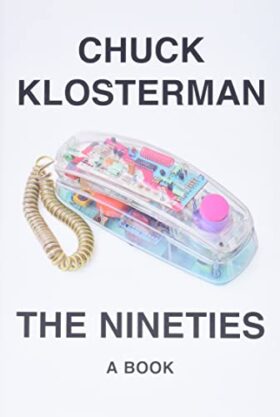
The Nineties
Author: Chuck Klosterman
Release: February 8, 2022
Tagline: A Book
Publisher: Penguin Press
Genre: History, Culture, Social Science
ISBN-10: 0735217955
ISBN-13: 978-0735217959
Synopsis: It was long ago, but not as long as it seems: The Berlin Wall fell and the Twin Towers collapsed. In between, one presidential election was allegedly decided by Ross Perot while another was plausibly decided by Ralph Nader. In the beginning, almost every name and address was listed in a phone book, and everyone answered their landlines because you didn’t know who it was. By the end, exposing someone’s address was an act of emotional violence, and nobody picked up their new cell phone if they didn’t know who it was. The 90s brought about a revolution in the human condition we’re still groping to understand. Happily, Chuck Klosterman is more than up to the job.
Declassified by Agent Palmer: Klosterman Ditches the Rose Colored Glasses to Look Back on The Nineties
Quotes and Lines
Now, the 1990s seem like a period when the world was starting to go crazy, but not so crazy that it was unmanageable or irreparable. It was the end of the twentieth century, but also the end to an age when we controlled technology more than technology controlled us. People played by the old rules, despite a growing recognition that those rules were flawed. It was a good time that happened long ago, although not nearly as long ago as it seems.
The most unhinged explanation for this phenomenon involves quantum mechanics and the possibility of alternate realities; the most rational explanation is that most of these memories were generated by people of the early nineties, a period when the obsession with popular culture exponentially increased without the aid of a mechanism that remembered everything automatically.
“There was Richard Linklater’s Slacker, there was Generation X, and there was Nirvana’s Nevermind. And it only takes three objects to make a constellation,” Coupland says. “So that’s what happened to me.”
An authentic jerk was preferable to a likeable sellout.
It was a confusing time to care about things.
The way the past is considered in retrospect has almost no relationship to what was assumed to be obvious at the time of the event.
There was, in 1993, a greater willingness to view reality as something that was only happening to oneself. History was an individual experience.
“If we’re the last people in history to know life before the Internet,” wrote Michael Harris in his book The End of Absence, “we are also the only ones who will ever speak, as it were, both languages. We are the only fluent translators of Before and After.”
The primacy of the landline connection dictated how life was lived, with such deep-rooted universality that its role in shaping humanity was virtually unconsidered. It was the single most important feature of every home, and nobody cared.
“Football combines two of the worst features of American life,” wrote conservative baseball scholar George Will. “It is violence punctuated by committee meetings.”
The world, as always, was changing. But it seemed increasingly possible that it was changing faster than its inhabitants could understand, so they just had to pretend that they did.
In the nineties, that was its own kind of problem. If everyone enjoyed something, how good could it possibly be?
Unless cataclysmic events are actively breaking, the purpose of cable news is emotional reassurance.
To those living in the true future of America, it would make no sense at all. But the future can’t exist until the present is past.
The 2000 presidential election is a broken memory. It’s a linear jigsaw puzzle where the pieces don’t always fit, prompting many to just give up and stick the entire box back into the closet.
All of the twenty-first century is lumped into the Internet Age, but most of 2001 was still the twentieth century in spirit.